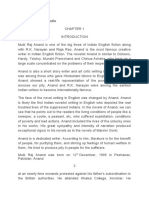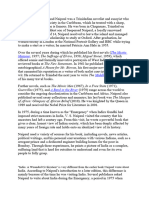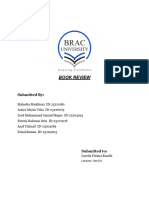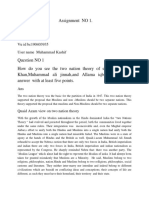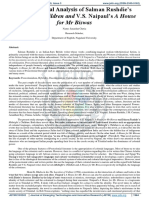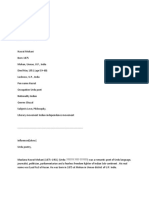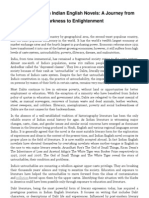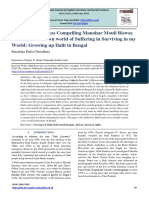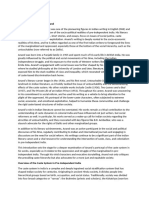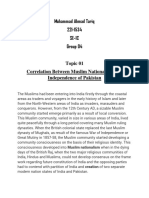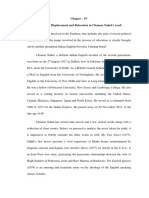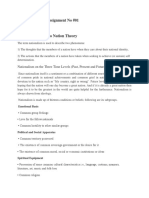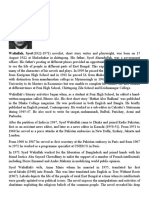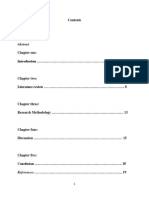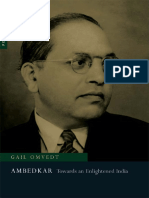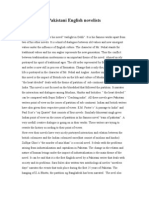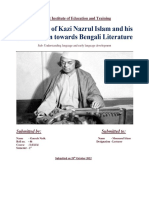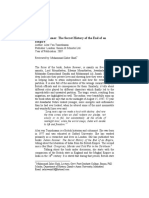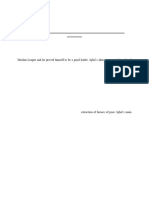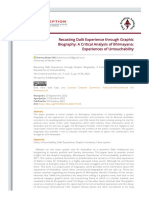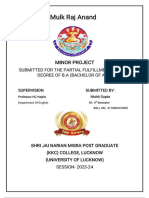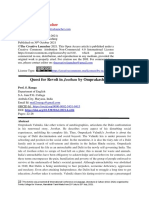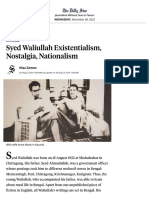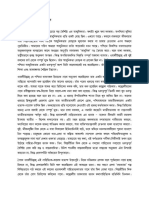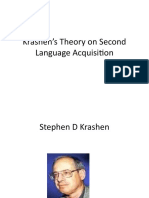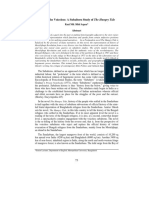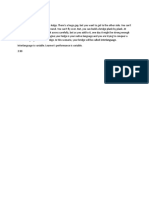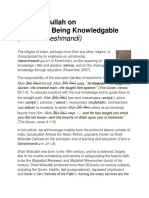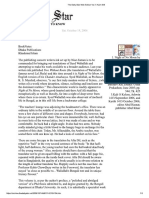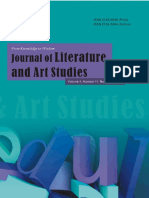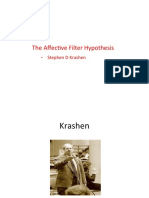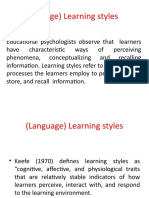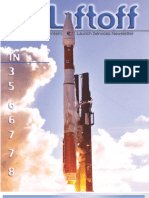0 ratings0% found this document useful (0 votes)
53 viewsSyed Waliullahs Writings Mirror of Socie
Syed Waliullahs Writings Mirror of Socie
Uploaded by
Aviram Dash AviSyed Waliullah was a prominent Bangladeshi novelist and writer who wrote in both Bengali and English. He was born in 1922 in Chittagong and died in 1971 in France. He is best known for his first novel Tree Without Roots, which provides social commentary on issues like class discrimination in South Asia and the colonial policies of Britain that divided Hindus and Muslims. Through his writings, he explored the internal problems facing Muslims and portrayed the impacts of famine in Bengal in the 1940s. Overall, his work served as a mirror reflecting the society and culture of Bangladesh.
Copyright:
© All Rights Reserved
Available Formats
Download as PDF, TXT or read online from Scribd
Syed Waliullahs Writings Mirror of Socie
Syed Waliullahs Writings Mirror of Socie
Uploaded by
Aviram Dash Avi0 ratings0% found this document useful (0 votes)
53 views3 pagesSyed Waliullah was a prominent Bangladeshi novelist and writer who wrote in both Bengali and English. He was born in 1922 in Chittagong and died in 1971 in France. He is best known for his first novel Tree Without Roots, which provides social commentary on issues like class discrimination in South Asia and the colonial policies of Britain that divided Hindus and Muslims. Through his writings, he explored the internal problems facing Muslims and portrayed the impacts of famine in Bengal in the 1940s. Overall, his work served as a mirror reflecting the society and culture of Bangladesh.
Copyright
© © All Rights Reserved
Available Formats
PDF, TXT or read online from Scribd
Share this document
Did you find this document useful?
Is this content inappropriate?
Syed Waliullah was a prominent Bangladeshi novelist and writer who wrote in both Bengali and English. He was born in 1922 in Chittagong and died in 1971 in France. He is best known for his first novel Tree Without Roots, which provides social commentary on issues like class discrimination in South Asia and the colonial policies of Britain that divided Hindus and Muslims. Through his writings, he explored the internal problems facing Muslims and portrayed the impacts of famine in Bengal in the 1940s. Overall, his work served as a mirror reflecting the society and culture of Bangladesh.
Copyright:
© All Rights Reserved
Available Formats
Download as PDF, TXT or read online from Scribd
Download as pdf or txt
0 ratings0% found this document useful (0 votes)
53 views3 pagesSyed Waliullahs Writings Mirror of Socie
Syed Waliullahs Writings Mirror of Socie
Uploaded by
Aviram Dash AviSyed Waliullah was a prominent Bangladeshi novelist and writer who wrote in both Bengali and English. He was born in 1922 in Chittagong and died in 1971 in France. He is best known for his first novel Tree Without Roots, which provides social commentary on issues like class discrimination in South Asia and the colonial policies of Britain that divided Hindus and Muslims. Through his writings, he explored the internal problems facing Muslims and portrayed the impacts of famine in Bengal in the 1940s. Overall, his work served as a mirror reflecting the society and culture of Bangladesh.
Copyright:
© All Rights Reserved
Available Formats
Download as PDF, TXT or read online from Scribd
Download as pdf or txt
You are on page 1of 3
Syed Waliullah’s writings, mirror of society
Syed Waliullah is one of the best known novelists in Bengali literature. He is a
modern Bangladeshi writer who writes inboth Bengali and English languages with
equal efficiency. He was born on 15 August, in 1922 in Chittagong and died on 10
October, 1971 in France. He is mostly known for his first novel Lalshalu,
translated by the author himself as Tree Without Roots (though its literal
translation Red Cloth). Besides a novelist, he is a story writer and playwright
Published : Tuesday, 31 October, 2017 at 12:00 AM Count : 19
Mohammad Jashim Uddin
Syed Waliullah is one of the best known novelists in Bengali literature. He is a modern
Bangladeshi writer who writes inboth Bengali and English languages with equal
efficiency. He was born on 15 August, in 1922 in Chittagong and died on 10 October,
1971 in France. He is mostly known for his first novel Lalshalu, translated by the author
himself as Tree Without Roots (though its literal translation Red Cloth). Besides a
novelist, he is a story writer and playwright.
His most known novels are: Lalsalu (Tree Without Roots (1948)), The Ugly Asian (1959),
Chander Amaboshay (Dark Moon) (1964), and Kando Nadi Kando (Cry, O River) (1968).
The popular plays are: Bahipir (1960), Tarangabhanga (1964), and Sudanga (1964). The
two well-known short story books are: Nayanchara (1951), and Dui Tir O Anyanya Galpa
(Akte Tulse Gaser Khine).
In 1940s, Bengali writers were divided into two major groups: one was totally Marxist
and the other was Islamist. In Sikandar Abu Zafor, Shanaul Haq, Syed Waliullah, Marxism
was significant; in Golam Mostafa, Shahadat Hossain, Talim Hossain, Farrukh Ahmed,
Islamism was significant. Among them, Syed Waliuullah was different because he was
also an existentialist.
Class discrimination is a common factor from the ancient period to present. In ancient,
there were two types of class: one is Royal class and the other was peasant class. Royal
class was dominated by Church and they presented them as a part of God. But after the
industrial revolution, upper, middle and lower class were introduced. Middle class
people have no rights to speak at all anywhere else and lower class people do not care
anything else.
Bengal was not also far away from this class division. In the Sen Period, Hindus were
mostly divided into four major casts. Except Bramhan, no one had any freedom of
choice anywhere. When the Muslims period was started the situation became changing
a bit gradually.
But new dimension aroused in that time. First, some peers were introduced as the
representatives of Allah. As a result, some illiterate and hypocrite people supported
them blindly, and they earned gigantic power. This was their business. So, they made a
wall between their followers and non-followers.
Second, some rich and Mughals called them Asrafh, the best human being in the
religion, and they treated the other as Atrafh, the worthless and trivial people who were
sent to carry the order of Asrafh. This discrimination is nothing but a clear suppression
on marginalized people by the central people.
Besides, Syed Waliullah highlighted another kind of discrimination in his writings. When
the East India Company conquered the subcontinent, they treated us as slave because
we are brown. So, in India, the British introduced a racial division based on religion and
skin colour. Later, they took a policy, divide and rule, to control the Indians (now
Indians, Pakistanis and Bangladeshis). Because of the policy, the relations between
Hindus and Muslims were broken and started the communal conflict.
Syed Waliullah represented all these aspects in his writings. At the same time, he took
some initiatives to focus the internal problems of Muslims. Lalshalu (Red Cloth),
translated name Tree Without Roots is two excellent examples of his excellence in this
regard. The novel has also been translated in French by Ann-Marie Thibaud. The novel
has also been translated in Urdu, Garman and Czech.
In the novel, both Majeed, the protagonist and a representative of central and rising
capitalistic society, as an individual and the people of Mahabbatpur collectively make
their choice to survive or strengthen their existence in this world. Instead of having an
existentialist approach, the novel portrays a newer conscious conscience of Majeed to
establish him as a modern hero in the Tree Without Roots.
Majeed represents the capitalistic society, for whom innumerous people are made
illiterate and encouraged to believe in superstitious. Besides Lalshalu, Syed Waliullah's
Nayanchara, a collection of short stories, is a mirror of society.
According to Saylen Gosh, "When people of the undivided Bengal were crying for food,
the ancient hidden cruel instinct came out nakedly to human being. This shy is
portrayed as a photograph in his story. No one could feel the truth like him. But two
stories in Nayanchara focused on the skeleton of 1943's famine in Bengal."
The other critic claims- Syed Waliullah need not have been any other stories to be
remembered forever as he has written 'Nayanchara'. In it, we see in the dark night when
the starving people are walking from one door to another door for some food in a city
which is made of bricks, some cruel and greedy ones are waiting to banish them. In the
story, light of cigarette symbolizes the ferocity of the British colony.
Then we see a young girl is waiting for a customer as all the family members are starving
in famine. So, she decides to sale her body for money. It is a great question whether her
intention should be considered as prostitution.
In conclusion, we hope Syed Waliullah will be studied more and more to explore his
desire to decorate Bangladesh. Though he lived abroad almost his career life, he never
forgot his country. As a result, we see he contributed in our Liberation war in 1971 and
every writing of him is reflected the society.
The writer is a senior lecturer at English Department of Northern University Bangladesh
www.observerbd.com/details.php?id=103292
You might also like
- Coolie by Mulk Raj AnandDocument30 pagesCoolie by Mulk Raj AnandKarthikNo ratings yet
- Anand CoolieDocument4 pagesAnand CoolieVipul BhavsarNo ratings yet
- Anand CoolieDocument4 pagesAnand CoolieVipul BhavsarNo ratings yet
- Anand CoolieDocument4 pagesAnand CoolieVipul BhavsarNo ratings yet
- Naipaul's India Wounded CivilizationDocument4 pagesNaipaul's India Wounded CivilizationRevathy M - Asst Prof, RVSCASNo ratings yet
- ARAVIND ADIGA 'S White Tiger - A Post - Colonial Study.Document5 pagesARAVIND ADIGA 'S White Tiger - A Post - Colonial Study.Cheshta SabharwalNo ratings yet
- Joothan: A Dalit's Life: 7KH0DJLFDO7UDQVIRUPDWLRQRI: 0Xwhqhvvlqwr9RlfhDocument18 pagesJoothan: A Dalit's Life: 7KH0DJLFDO7UDQVIRUPDWLRQRI: 0Xwhqhvvlqwr9Rlfhojasvi gulyani100% (1)
- Book Review Group-4Document6 pagesBook Review Group-4pandagirl5871No ratings yet
- Dalit LiteratureDocument18 pagesDalit LiteratureChinmoyee SurNo ratings yet
- Assignment No 1. Pak 301Document3 pagesAssignment No 1. Pak 301Muhammad KashifNo ratings yet
- Victimization of Women in Twilight in DelhiDocument6 pagesVictimization of Women in Twilight in DelhiIJELS Research JournalNo ratings yet
- Kothari, Rita - Unbordered Memories - Sindhi Stories of Partition (2018, Penguin Random House India Private Limited) - Libgen - LiDocument172 pagesKothari, Rita - Unbordered Memories - Sindhi Stories of Partition (2018, Penguin Random House India Private Limited) - Libgen - Liswastika972013No ratings yet
- Ahmed Ali and Attia Hosain, Works of - Hafiza JamalDocument121 pagesAhmed Ali and Attia Hosain, Works of - Hafiza JamalHarjinder Singh Dhaliwal100% (1)
- Diaspora and Expatriation in Indian English LiteratureDocument18 pagesDiaspora and Expatriation in Indian English LiteratureKumaresan RamalingamNo ratings yet
- Postcolonial Analysis of Salman Rushdie'sDocument3 pagesPostcolonial Analysis of Salman Rushdie'sRajesh HazraNo ratings yet
- Jump ToDocument31 pagesJump ToCling EastwoodNo ratings yet
- Recent Trends in Indian English NovelsDocument3 pagesRecent Trends in Indian English Novelsbibhudatta dash100% (1)
- 10IJELS 102202150 SocietalDocument7 pages10IJELS 102202150 SocietalIJELS Research JournalNo ratings yet
- Dalit Meaning and Its StudyDocument4 pagesDalit Meaning and Its StudyKAMALSUTHAR6061ANo ratings yet
- Eqbal Ahmad On Jinnah SahibDocument3 pagesEqbal Ahmad On Jinnah Sahibalisyed37No ratings yet
- English Sem 3 ProjectDocument11 pagesEnglish Sem 3 Projectudayps2006No ratings yet
- 50 Years of Publication of - Sunlight On A Broken Column' - A Classic Novel by Attia Hosain Chaman LalDocument5 pages50 Years of Publication of - Sunlight On A Broken Column' - A Classic Novel by Attia Hosain Chaman LalP ProductionsNo ratings yet
- Gmail Critical Analysis of The Home and The World PDFDocument5 pagesGmail Critical Analysis of The Home and The World PDFGaurav KumarNo ratings yet
- DuaDocument4 pagesDuaTayyab MahmoodNo ratings yet
- Allama Iqbal and Quaid e Azam in Two Nation TheoryDocument23 pagesAllama Iqbal and Quaid e Azam in Two Nation TheorySifat ullah shah pakhtoon100% (1)
- Pak Studies Assignment 02 PDFDocument7 pagesPak Studies Assignment 02 PDFi221534 Muhammad AhmadNo ratings yet
- Chapter 4Document32 pagesChapter 4aswinb973No ratings yet
- 01muhammad AmirDocument16 pages01muhammad AmirDilawar MumtazNo ratings yet
- Dalit Literature ThesisDocument8 pagesDalit Literature ThesisPaySomeoneToWritePaperUK100% (2)
- The Heart Divided: A Post Colonial Perspective On Partition: AbstractDocument11 pagesThe Heart Divided: A Post Colonial Perspective On Partition: AbstractShafaNo ratings yet
- Assignment No #01: Nationalism On The Three Time Levels (Past, Present and Future)Document5 pagesAssignment No #01: Nationalism On The Three Time Levels (Past, Present and Future)MuhammadAxadKhataabGujjarNo ratings yet
- Chapter-II: Dalit Consciousness in Indian Writing in EnglishDocument41 pagesChapter-II: Dalit Consciousness in Indian Writing in EnglishSamir Dey100% (1)
- WaliullahDocument3 pagesWaliullahdhruvaNo ratings yet
- The Side of Rabindranath Tagore That Liberal Intellectuals Dont Want You To See Here Is What He ThougDocument5 pagesThe Side of Rabindranath Tagore That Liberal Intellectuals Dont Want You To See Here Is What He ThougShahid Ul HaqueNo ratings yet
- Chapter 1Document60 pagesChapter 1muskiii1018No ratings yet
- 08 - Chapter 3Document58 pages08 - Chapter 3Khubaib Akbar100% (1)
- Final ThesisDocument19 pagesFinal Thesisrindkashif186No ratings yet
- 10 - Chapter 5 PDFDocument36 pages10 - Chapter 5 PDFAli RazaNo ratings yet
- Poisoned Bread Translations From Modern Marathi Dalit Literature (Arjuna Dangale) - 15-19Document5 pagesPoisoned Bread Translations From Modern Marathi Dalit Literature (Arjuna Dangale) - 15-19ANKIT KUMAR DUBEYNo ratings yet
- Ambedk Enlightened IndiaDocument159 pagesAmbedk Enlightened IndiaPurogami SatyashodhakNo ratings yet
- Book Review The Home and The WorldDocument3 pagesBook Review The Home and The Worldproharsaha04No ratings yet
- Twilight in DehliDocument2 pagesTwilight in DehliNimra Anwar50% (2)
- Gaurishankar Govardhandas JoshiDocument4 pagesGaurishankar Govardhandas JoshiRishabh Rai Thakral0% (2)
- Ambedkar (Gail Omvedt, Gail) (Z-Library)Document159 pagesAmbedkar (Gail Omvedt, Gail) (Z-Library)Vamsi VirajNo ratings yet
- Pakistani English NovelistsDocument2 pagesPakistani English Novelistsbc070400339No ratings yet
- DocumentlastDocument9 pagesDocumentlastgauravNo ratings yet
- MonalisaDocument6 pagesMonalisaNandini ChohanNo ratings yet
- The Inheritance of LossDocument40 pagesThe Inheritance of LossrashmiNo ratings yet
- Allahbad AddressDocument16 pagesAllahbad AddressMalik Zeeshan Fraz100% (1)
- Dialogue April June2012 204-207Document4 pagesDialogue April June2012 204-207Nikhil MiriyalaNo ratings yet
- Marginality and Postcolonialism in Kiran DesaiDocument9 pagesMarginality and Postcolonialism in Kiran DesaiDebayan BasuNo ratings yet
- Chapter-3 Jawaharlal Nehru and The Freedom MovementDocument65 pagesChapter-3 Jawaharlal Nehru and The Freedom MovementKalpna RawatNo ratings yet
- Shadows of History in The Shadow LinesDocument5 pagesShadows of History in The Shadow LinesaaditotjoNo ratings yet
- Nirad Chaudhari-1Document12 pagesNirad Chaudhari-1Yash MarakanaNo ratings yet
- Study Material 1 DR - Farkhanda WarsiDocument4 pagesStudy Material 1 DR - Farkhanda Warsirajputgulzar686No ratings yet
- EOUTDocument4 pagesEOUTZenith RoyNo ratings yet
- Ilovepdf MergedDocument73 pagesIlovepdf MergedVinay YadavNo ratings yet
- Quest For Revolt in Joothan by Omprakash ValmikiDocument5 pagesQuest For Revolt in Joothan by Omprakash ValmikiSandipan MandalNo ratings yet
- Book ReviewDocument4 pagesBook ReviewAshwina YadavNo ratings yet
- Women As Subalterns in Jhumpa Lahiris The TreatmeDocument9 pagesWomen As Subalterns in Jhumpa Lahiris The TreatmeAviram Dash AviNo ratings yet
- Walliulladdh IntDocument24 pagesWalliulladdh IntAviram Dash AviNo ratings yet
- WaliullahDocument6 pagesWaliullahAviram Dash AviNo ratings yet
- WailullahDocument1 pageWailullahAviram Dash AviNo ratings yet
- Bringing Subalterns Into Speech? Investigating Anarchic Resistance To Hegemonic ModernityDocument23 pagesBringing Subalterns Into Speech? Investigating Anarchic Resistance To Hegemonic ModernityAviram Dash AviNo ratings yet
- Women The Subaltern in Subaltern StudiesDocument6 pagesWomen The Subaltern in Subaltern StudiesAviram Dash AviNo ratings yet
- Rosinka Chaudhuri Article Historicality in LiteratureDocument6 pagesRosinka Chaudhuri Article Historicality in LiteratureAviram Dash AviNo ratings yet
- Walliullah IntDocument7 pagesWalliullah IntAviram Dash AviNo ratings yet
- Using English As A Weapon of ResistanceDocument11 pagesUsing English As A Weapon of ResistanceAviram Dash AviNo ratings yet
- Subaltern StudiesDocument3 pagesSubaltern StudiesAviram Dash AviNo ratings yet
- Acquisition - Learning HypothesisDocument31 pagesAcquisition - Learning HypothesisAviram Dash AviNo ratings yet
- Voice of The Voiceless A Subaltern Study of The Hungry TideDocument8 pagesVoice of The Voiceless A Subaltern Study of The Hungry TideAviram Dash AviNo ratings yet
- The New Subaltern in Arundhati Roys The Ministry of Utmost Happiness1Document12 pagesThe New Subaltern in Arundhati Roys The Ministry of Utmost Happiness1Aviram Dash AviNo ratings yet
- Inter LanguageDocument4 pagesInter LanguageAviram Dash AviNo ratings yet
- Representation of The Oppressed in Untouchable and Tree Without RootsDocument3 pagesRepresentation of The Oppressed in Untouchable and Tree Without RootsAviram Dash AviNo ratings yet
- Shah Waliullah On The Art of Being KnowlDocument8 pagesShah Waliullah On The Art of Being KnowlAviram Dash AviNo ratings yet
- SsssDocument3 pagesSsssAviram Dash AviNo ratings yet
- Revisiting The Myth of Irishness and HerDocument154 pagesRevisiting The Myth of Irishness and HerAviram Dash AviNo ratings yet
- Monitor HypothesisDocument11 pagesMonitor HypothesisAviram Dash AviNo ratings yet
- Revisitingsubalternstudies Book 27.07.2022!32!42Document12 pagesRevisitingsubalternstudies Book 27.07.2022!32!42Aviram Dash AviNo ratings yet
- Affective Filter HypothesisDocument21 pagesAffective Filter HypothesisAviram Dash AviNo ratings yet
- Language) Learning StylesDocument28 pagesLanguage) Learning StylesAviram Dash AviNo ratings yet
- Input HypothesisDocument21 pagesInput HypothesisAviram Dash AviNo ratings yet
- An Analysis of Interlanguage Features and EnglishDocument7 pagesAn Analysis of Interlanguage Features and EnglishAviram Dash AviNo ratings yet
- AcculturationDocument16 pagesAcculturationAviram Dash AviNo ratings yet
- AcculturationDocument5 pagesAcculturationAviram Dash AviNo ratings yet
- 01 07 NotesDocument6 pages01 07 NotesjulianamariavazquezNo ratings yet
- Climate Proofing: A Risk-Based Approach in Policy Making in Bucari Pine Forest, Leon, IloiloDocument20 pagesClimate Proofing: A Risk-Based Approach in Policy Making in Bucari Pine Forest, Leon, IloiloJose Marie A. EsloporNo ratings yet
- Sunita Sharma: Application Form (For Resident Applicants) Asba Application FormDocument1 pageSunita Sharma: Application Form (For Resident Applicants) Asba Application Formitsyour vinESNo ratings yet
- Municipalidad Provincial de Huaraz: "Año de Fa "Diversification "Productivay Def "Tortafecimiento de Fa "Educación "Document20 pagesMunicipalidad Provincial de Huaraz: "Año de Fa "Diversification "Productivay Def "Tortafecimiento de Fa "Educación "edwin2x2No ratings yet
- Obstetric Violence - A Latin American Legal Response To Mistreatment During ChildbirthDocument4 pagesObstetric Violence - A Latin American Legal Response To Mistreatment During ChildbirthAnaNo ratings yet
- New Year's Eve 2018 - Google Doodles Wiki - FandomDocument4 pagesNew Year's Eve 2018 - Google Doodles Wiki - FandomchefchadsmithNo ratings yet
- AgreementDocument4 pagesAgreementRONALYN SANTOSNo ratings yet
- 2nd Quarter Exam - Gen MathDocument4 pages2nd Quarter Exam - Gen MathAgnes Ramo96% (27)
- Danh Sach Khach Hang PMH Phan 23Document7 pagesDanh Sach Khach Hang PMH Phan 23DiepNo ratings yet
- India's Electronics and Software Export 2008-09Document104 pagesIndia's Electronics and Software Export 2008-09Vikas GuptaNo ratings yet
- The Multichannel Challenge at Natura in Beauty and Personal Care (C) Digital Transformation and Toward A Fintech BusinessDocument18 pagesThe Multichannel Challenge at Natura in Beauty and Personal Care (C) Digital Transformation and Toward A Fintech BusinessLikhithNo ratings yet
- SPC Appointment System - Chapter 1Document7 pagesSPC Appointment System - Chapter 1Namja PyosiNo ratings yet
- ResultDocument2 pagesResultb210868No ratings yet
- Bai Tap Tieng Anh 9 Bai 4Document16 pagesBai Tap Tieng Anh 9 Bai 4Trang ThùyNo ratings yet
- Invoice Puma Jacket FlipcartDocument5 pagesInvoice Puma Jacket FlipcartPrashant AdhikariNo ratings yet
- Margaret Mead - SAZREVANJE NA SAMOIDocument229 pagesMargaret Mead - SAZREVANJE NA SAMOID-JOPNo ratings yet
- ILS Liftoff Fall 2002Document5 pagesILS Liftoff Fall 2002Michael HuntNo ratings yet
- Maj Sherly V MDocument67 pagesMaj Sherly V MHydra Olivar - PantilganNo ratings yet
- CSC Job Portal: National Irrigation Administration - Region ViiDocument1 pageCSC Job Portal: National Irrigation Administration - Region ViiRamos KeiNo ratings yet
- Chenrezig Commentaries IDocument64 pagesChenrezig Commentaries IJason EspadaNo ratings yet
- Bahasa Inggeris K3 SET 2 MPP3 2022Document8 pagesBahasa Inggeris K3 SET 2 MPP3 2022FhatinNo ratings yet
- Offering Letter 2023Document9 pagesOffering Letter 2023angel_leonoraNo ratings yet
- Shakespeare and The Renaissance EraDocument8 pagesShakespeare and The Renaissance ErasbahlemalekaNo ratings yet
- MSADocument10 pagesMSArajat goyalNo ratings yet
- Soft Corporate Offer (Sco)Document2 pagesSoft Corporate Offer (Sco)Trindra Paul100% (2)
- Mathematics SbaDocument6 pagesMathematics Sbajaylicia beckett83% (6)
- Uganda Top Property Management CompaniesDocument3 pagesUganda Top Property Management CompaniesGregory KagoohaNo ratings yet
- Account Statement - Aug 31, 2020Document7 pagesAccount Statement - Aug 31, 2020judyvijayNo ratings yet
- 2024 Persuasive Essay Requirements-100 PointsDocument3 pages2024 Persuasive Essay Requirements-100 Pointsvanessam100109No ratings yet
- Western Balkans MacedoniaDocument19 pagesWestern Balkans MacedoniamumikaNo ratings yet
